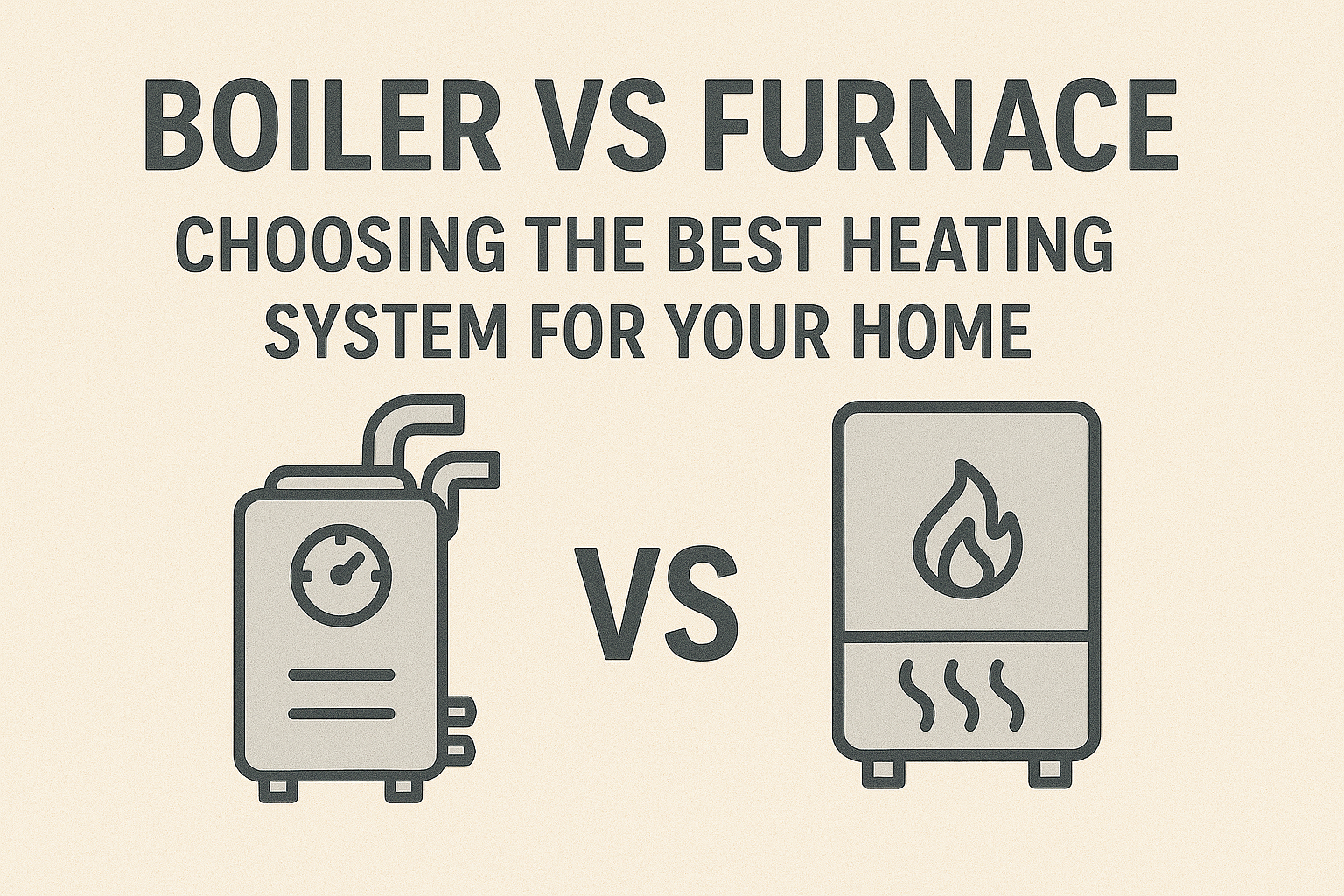When it comes to residential heating, selecting the right system can dramatically affect comfort, energy efficiency, and utility costs. Two of the most common choices—boilers and furnaces—each offer unique advantages and considerations. In this comprehensive guide, we compare both systems in detail to help you make an informed decision that aligns with your home’s structure, climate, and budget.
🔍 What Is a Boiler?
A boiler is a closed-loop heating system that heats water to provide warmth throughout your home. The heated water or steam travels through a network of pipes to radiators, baseboard heaters, or radiant floor systems.
✅ Key Features of Boilers:
- Uses hot water or steam
- Provides radiant heat
- No air ducts required
- Ideal for allergy sufferers (no air blowing)
🔧 Types of Boilers:
- Combi Boilers – Combine water heating and space heating in one unit.
- System Boilers – Work with a storage tank but without a cold water tank.
- Conventional Boilers – Require both a hot water cylinder and a cold water tank.
🔍 What Is a Furnace?
A furnace is a forced-air system that heats air and distributes it through a ductwork system via blowers. It’s one of the most common heating solutions in North America.
✅ Key Features of Furnaces:
- Uses warm air circulated via ducts
- Can be paired with central AC systems
- Heats rooms faster than boilers
- Requires regular filter replacement
🔧 Types of Furnaces:
- Gas Furnaces – Most popular due to lower fuel costs
- Electric Furnaces – Easier installation, higher operational costs
- Oil Furnaces – Less common, typically in older homes
🔥 Heating Efficiency: Boiler vs Furnace
Boiler Efficiency:
Boilers generally provide more consistent and even heat. Modern condensing boilers offer AFUE ratings of 90–98.5%, making them extremely efficient.
Furnace Efficiency:
Furnaces heat air quickly and efficiently, especially high-efficiency models with AFUE ratings up to 98%. However, air ducts can lead to up to 30% energy loss if not properly sealed.
💸 Installation & Cost Comparison
| System | Average Installation Cost | Lifespan | Maintenance Needs |
| Boiler | $4,000 – $10,000 | 15 – 30 years | Low (no filters) |
| Furnace | $2,000 – $7,000 | 15 – 20 years | Moderate (filters, ducts) |
Note: Installation costs can vary based on the type of system, home size, and regional labor rates.
🌬️ Air Quality & Comfort Levels
Boilers:
- Radiant heat feels more natural and less drying
- No air movement = less dust and allergens
- Quiet operation
Furnaces:
- Blows air through vents, which can spread dust, pollen, and pet dander
- Requires regular duct cleaning and filter changes
- May cause dry indoor air in winter
❄️ Climate Considerations
- Boilers excel in colder regions where radiant heat can maintain consistent warmth even in sub-zero temperatures.
- Furnaces perform well in moderate to cold climates, especially when paired with modern thermostats and zoning systems.
♻️ Energy Source Flexibility
Boiler Fuel Options:
- Natural Gas
- Oil
- Propane
- Electricity
- Wood Pellet (biomass boilers)
Furnace Fuel Options:
- Natural Gas (most common)
- Electricity
- Oil
- Propane
Boilers tend to offer more versatile fuel options, especially in off-grid areas.
🛠️ Maintenance Requirements
Boiler Maintenance:
- Annual inspection
- Flushing sediment buildup
- Pressure level checks
- Fewer moving parts = less frequent issues
Furnace Maintenance:
- Seasonal tune-ups
- Monthly filter replacement
- Duct cleaning every 3–5 years
- More mechanical components = higher failure points
🏠 Space and Installation Requirements
- Boilers require more floor space and pipework.
- Furnaces can be installed in attics or crawlspaces, making them suitable for homes with limited mechanical space.
📈 Long-Term Value & ROI
| Factor | Boiler | Furnace |
| Upfront Cost | Higher | Lower |
| Monthly Energy Bills | Often Lower (Radiant Efficiency) | Higher in older ducted systems |
| Resale Value | Higher in cold regions | Neutral to moderate |
| System Longevity | Longer | Shorter |
🧠 Decision-Making Summary
Choose a Boiler if:
- You want quiet, consistent radiant heat
- You live in a cold climate
- You suffer from allergies or asthma
- You value long-term efficiency
Choose a Furnace if:
- You want faster heating and airflow
- Your home already has ductwork
- You live in a moderate to variable climate
- You need integration with central AC
🚀 Final Thoughts
Boilers and furnaces each serve homeowners differently. While boilers offer radiant, hypoallergenic heat and greater efficiency, furnaces provide faster, ducted air heating and simpler integration with cooling systems. Understanding your specific home requirements, climate, and long-term plans is key to choosing the most effective solution.
For ultimate comfort, long-term savings, and system performance, consult with a certified HVAC professional to assess your home’s insulation, square footage, and existing infrastructure before committing to any system.

